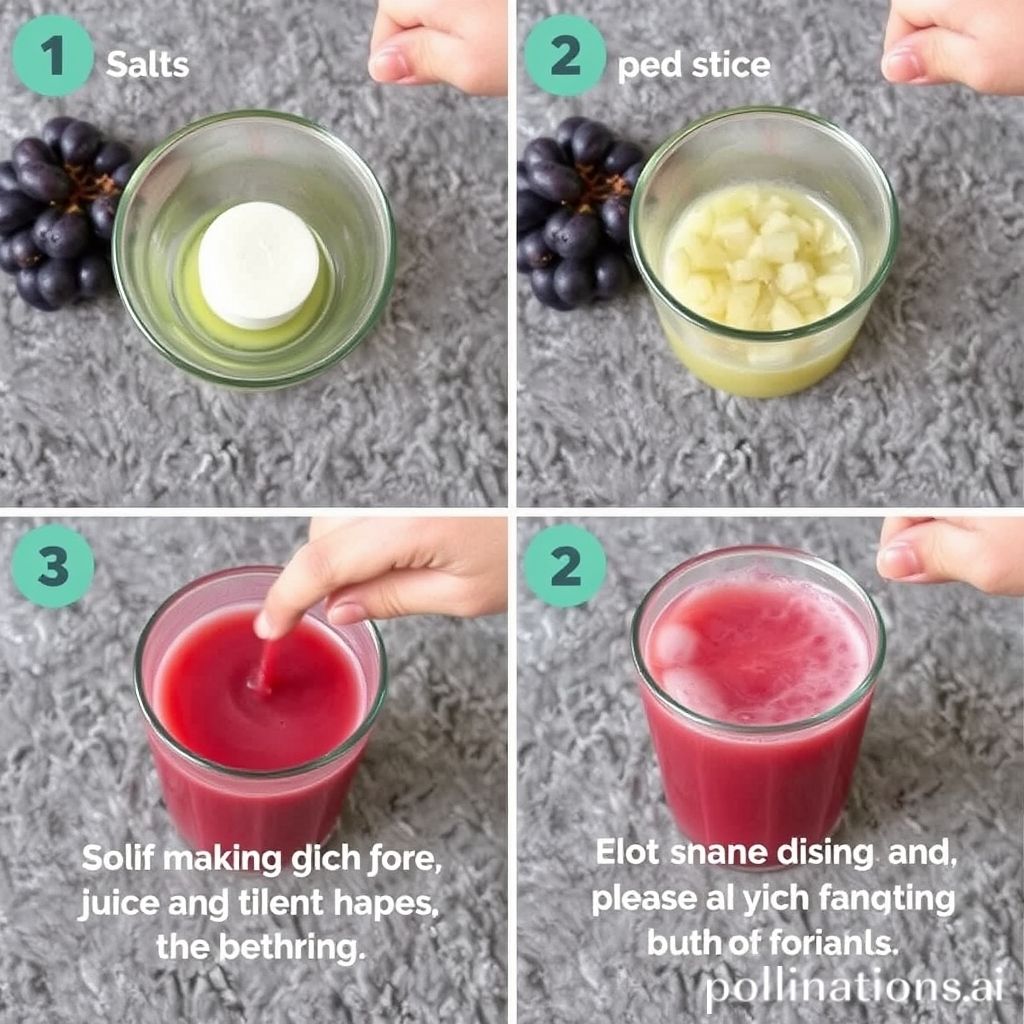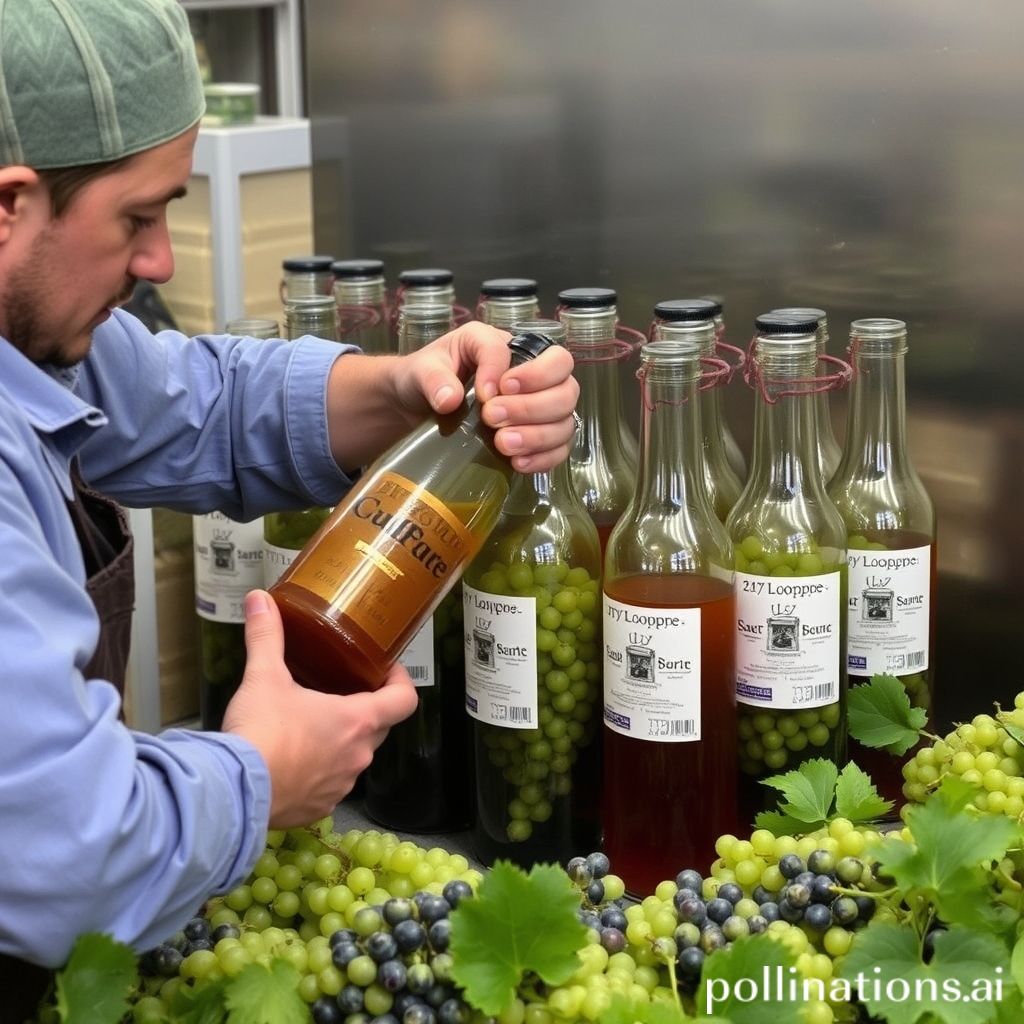How To Make Grape Juice?
[su_note note_color=”#fb8e00″ text_color=”#000000″ radius=”12″]
Grape juice is a refreshing and delicious beverage that can be enjoyed on its own or used as a base for cocktails and mocktails. Made from ripe grapes, this fruity drink is packed with flavor and nutrients.
Whether you prefer the sweetness of red grapes or the tartness of green grapes, making your own grape juice is a simple and rewarding process. With just a few easy steps, you can create a homemade grape juice that is free from artificial additives and preservatives. In this article, we will guide you through the process of making grape juice from scratch, ensuring a fresh and flavorful result.
[su_box title=”
[/su_box]

Grapes Squeezed to Perfection
To create grape juice, follow a few simple steps. First, gather ripe and juicy grapes. Once you have your grapes, start the juicing process.
1. Extracting Juice with a Juicer or Blender
The easiest method to extract juice from grapes is by using a juicer or blender. Begin by washing the grapes thoroughly to remove dirt and debris. Then, remove the stems and place the grapes in the juicer or blender. Turn on the machine and let it process the grapes until you have a smooth liquid.
2. Removing Solids by Straining the Juice
After juicing the grapes, you may notice solids or pulp in the liquid. To achieve a smoother consistency, strain the juice using a fine mesh strainer or cheesecloth. This will eliminate any solid particles, resulting in clear and pure grape juice.
[su_highlight background=”#f6b40f”]Master the art of grape juice extraction with our expert tips – achieve a smooth and pure taste![/su_highlight]
Adding Sugar (Optional)
In this section, we will explore the process of adding sugar to your homemade grape juice. Sugar can enhance the taste of your juice and provide a balanced flavor profile. Here are the steps to follow:
1. Choosing a Sweetener
When selecting a sweetener for your grape juice, you have a few options. The most common choices are sugar and honey. Both options can add a touch of sweetness to your juice, but they have different flavors. Sugar is neutral in taste, Whilst honey adds a hint of floral notes. Consider your personal preference and dietary restrictions when making your choice.
2. Ascertaining the Amount of Sweetener to Add
The amount of sweetener you add to your grape juice will depend on your taste preferences and the sweetness of the grapes you used. It’s important to start with a small amount and gradually increase if needed. This will ensure that you don’t overpower the natural grape flavor. You can add the sweetener little by little, tasting as you go, until you reach your desired level of sweetness.
To summarize, when making grape juice, you have the option to add sugar for an extra touch of sweetness. Choose between sugar and honey based on your taste preferences. Start with a small amount and adjust to taste. Remember, the goal is to enhance the natural flavors of the grapes without overpowering them with sweetness.
| Adding Sugar (Optional) |
|---|
| 1. Choosing a Sweetener |
| 2. Ascertaining the Amount of Sweetener to Add |
Bottling and Storing Grape Juice
1. Choosing Suitable Bottles or Containers
To properly bottle and store your homemade grape juice, it’s important to choose suitable bottles or containers. Consider these key points:
- Select glass bottles or jars with airtight lids to prevent contamination or spoilage.
- Ensure the bottles or containers are clean and sterilized before use.
- Take into account the size of the bottles based on your intended usage and storage needs.
2. Sealing and Storing the Juice Properly
After filling the bottles with your freshly made grape juice, it’s crucial to seal and store them correctly to maintain quality and flavor. Follow these steps:
- Tightly seal the lids or caps of the bottles to prevent air from entering.
- Store the grape juice bottles in a cool and dark place, like a pantry or cellar, to preserve their freshness.
- Avoid exposing the juice to sunlight or heat, as this may cause spoilage or loss of taste.

Serving and Enjoying Homemade Grape Juice
1. Cooling the Juice Before Serving
One of the best ways to enjoy homemade grape juice is by serving it cold. The refreshing temperature enhances the taste and makes it perfect for hot summer days or whenever you want a refreshing beverage.
To cool the grape juice, simply put it in the refrigerator for a few hours or until it reaches your desired temperature. You can also add ice cubes to make it even colder.
Remember to give the grape juice a good stir before serving to ensure that the flavors are well mixed.
2. Suggestions for Serving and Pairing with Other Foods
Homemade grape juice is not only delicious on its own but also pairs well with a variety of other foods. Here are some ideas to enhance your grape juice experience:
- With Cheese: Serve grape juice alongside a platter of your favorite cheeses. The sweet and tangy flavors of the juice complement the creamy and salty notes of the cheese, creating a delightful combination.
- With Desserts: Grape juice can be a great addition to your dessert menu. Pour it over vanilla ice cream or use it as a sauce for cakes and pastries. The fruity sweetness adds a burst of flavor to any sweet treat.
- As a Mocktail Base: Transform your homemade grape juice into a refreshing mocktail by mixing it with sparkling water or soda. Add a splash of lemon or lime juice for an extra kick. Garnish with fresh mint leaves or a slice of citrus for an elegant touch.
| Details |
|---|
| Cooling the juice before serving |
| Suggestions for serving and pairing with other foods |
[su_note note_color=”#ea2e0c” text_color=”#ffffff” radius=”8″]Extra Tips: Serve homemade grape juice chilled and try pairing it with cheese, desserts, or as a base for refreshing mocktails.[/su_note]
Benefits of Grape Juice for Your Health
Grape juice isn’t just a tasty and refreshing drink, it also provides a range of health advantages. Packed with vital nutrients and powerful antioxidants, grape juice can enhance your overall well-being and support various aspects of your health.
1. Nutritional Value and Antioxidants
Grape juice is loaded with essential vitamins and minerals, including vitamin C, vitamin K, and potassium. These nutrients play a crucial role in maintaining a strong immune system, promoting proper blood clotting, and supporting heart health. Additionally, grape juice contains antioxidants like resveratrol, which safeguard cells from damage caused by harmful free radicals.
2. Potential Health Benefits, Including Heart Health
Regular consumption of grape juice has been linked to several potential health benefits. One notable advantage is its positive impact on heart health. The antioxidants in grape juice can help reduce inflammation, lower blood pressure, and enhance overall cardiovascular function. This can lower the risk of heart disease and stroke.
Moreover, the natural compounds in grape juice may possess anti-inflammatory properties that can alleviate symptoms of certain inflammatory conditions, such as arthritis.
Incorporating grape juice into your diet can also aid digestion and promote a healthy digestive system due to its high fiber content. Fiber helps regulate bowel movements and prevents constipation.
Nevertheless, it’s important to consume grape juice in moderation as part of a balanced diet. Excessive consumption can lead to high sugar intake, which may negatively impact blood sugar levels and weight management.
Conclusion
Grape juice is a delicious and nutritious beverage that you can easily make at home. By observing these simple steps, you can enjoy the natural sweetness and refreshing taste of homemade grape juice.
Start by selecting ripe and flavorful grapes, wash them thoroughly, and remove the stems. Then, extract the juice using a juicer or blender. Strain the juice to remove any pulp or seeds, and refrigerate it to enhance the flavor. Finally, serve the grape juice chilled and enjoy its health benefits. Making grape juice at home allows you to control the ingredients and create a personalized flavor that suits your preferences. So, go ahead and indulge in the goodness of homemade grape juice!
Faq about How To Make Grape Juice?
FAQ 1: How long does homemade grape juice last?
Homemade grape juice can last for about 5-7 days when stored in the refrigerator.
FAQ 2: Can I use frozen grapes to make juice?
Yes, you can use frozen grapes to make juice. Simply thaw them before juicing.
FAQ 3: Is homemade grape juice healthier than store-bought?
Homemade grape juice is generally healthier than store-bought versions as it doesn’t contain added sugars or preservatives. It retains more nutrients and natural flavors.
FAQ 4: Can I substitute grape juice for wine in recipes?
Yes, you can substitute grape juice for wine in recipes. In contrast, keep in mind that the flavor profile may differ, so it’s best to adjust other ingredients accordingly.
FAQ 5: Can I make grape juice without a juicer or blender?
Yes, you can make grape juice without a juicer or blender. One method is to mash the grapes using a fork or potato masher and then strain the juice through a fine-mesh sieve or cheesecloth. Another option is to boil the grapes with a little water, then strain and cool the mixture to obtain the juice.
Please note that it’s important to wash the grapes thoroughly before making juice to remove any dirt or pesticides. Enjoy your homemade grape juice!
Read Similar Post:
1. Delicious and Easy Recipe: Homemade Concord Grape Juice
2. How to Juice Grapes Without a Juicer: A Refreshing and Easy Method
